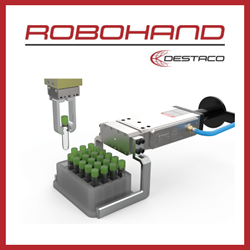Young Faculty Award Program Casts Its Widest Net Ever for Innovative Defense Research Proposals
2014 YFA announcement increases the number of research topics from 13 to 18 and for the first time permits teaming with subcontractors
DARPA defines its research portfolio within a framework that puts the Agency's enduring mission in the context of tomorrow's environment for national security and technology. An integral part of this strategy includes establishing and sustaining a pipeline of talented scientists, engineers, and mathematicians who are motivated to pursue high risk, high payoff fundamental research in disciplines that are critical to maintaining the technological superiority of the U.S. military.
DARPA's Young Faculty Awards (YFA) program addresses this need by funding the work of promising researchers and pairing them with DARPA program managers. This pairing provides YFA researchers with mentoring and networking opportunities as well as exposure to DoD technology needs and the overall research and development process. The 2014 YFA solicitation includes technical topic areas in the physical sciences, engineering, materials, mathematics, biology, computing, informatics and manufacturing disciplines that are relevant to the research interests of DARPA's Defense Sciences and Microsystems Technology Offices.
"YFA offers promising junior faculty members and their peers at nonprofit research institutions the chance to do potentially revolutionary work much earlier in their careers than they otherwise could," said William Casebeer, DARPA program manager for the 2014 class. "By expanding the list of research topics this year from 13 to 18 - our largest portfolio since the program started in 2006 - we hope to attract even more creative proposals that could lead to future breakthroughs on critical defense challenges. The growth reflects how successful past awardees have been in supporting DARPA's mission."
Eligible applicants must be employed in U.S. institutions of higher learning and within five years of appointment to a tenure-track position, or hold equivalent positions at non-profit research institutions.
Researchers selected for YFA grants receive up to $500,000 in funding over a 24-month period. As many as four of the most exceptional performers may be selected to receive up to another $500,000 over an additional year under a DARPA Director's Fellowship.
DARPA is, for the first time, permitting proposers to form partnerships with subcontractors. The subcontractor relationship cannot exceed 30 percent of the total grant value. In addition to enhancing the competitiveness of proposed research plans, this change is designed to provide young investigators with the opportunity to manage a multidisciplinary team and gain a better understanding of the work performed by a DARPA program manager.
"The YFA program represents a strategic investment in fundamental research and professional development of the next generation of scientists and engineers focused on defense and national security issues," said Mari Maeda, director of DARPA's Defense Sciences Office. "It also benefits the young researchers and their institutions by engaging them in valuable, high-risk, high-impact research, providing a mentoring relationship with a DARPA program manager, expanding channels for future ideas to flow, and, now, exposing them to the rigors of managing a multidisciplinary team."
The list of technical topic areas for 2014 includes:
*Optimizing Supervision for Improved Autonomy
*Neurobiological Mechanisms of Social Media Processing
*Next-generation Neural Sensing for Brain-Machine Interfaces
*Mathematical and Computational Methods to Identify and Characterize Logical and Causal Relations in Information
*Time-Dependent Integrated Computational Materials Engineering
*Long-range Detection of Special Nuclear Materials
*Alternate Fusion Concepts
*New Materials and Devices for Monitoring and Modulating Local Physiology
*Methods and Theory for Fundamental Circuit-Level Understanding of the Human Brain
*Hierarchically Complex Materials that Respond and Adapt
*Disruptive Materials Processing
*Disruptive Computing Architectures
*Appliqu© Antenna Elements for Platform Integration
*Modeling Phonon Generation and Transport in the Near Junction Region of Wide-Bandgap Transistors
*Advanced Automation and Microfluidic Technologies for Engineering Biology
*Energy Recovery in Post-CMOS Technologies
*Thin Film Transistors for High-performance RF and Power Electronics
*Neural-inspired Computer Engineering
For additional details on the technical topic areas and application instructions for the Young Faculty Awards, please view the solicitation at: http://go.usa.gov/WEhk.
Featured Product

